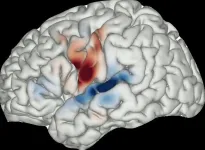(Press-News.org) WASHINGTON, D.C. — The Patient-Centered Outcomes Research Institute (PCORI) has approved funding awards totaling more than $156 million for new patient-centered comparative clinical effectiveness research (CER), as well as research to improve methods and strengthen the science of engagement in CER. The awards will support 13 CER studies, including three focused on sleep interventions.
“Poor sleep affects more than 50 million people in the United States and is linked to multiple chronic conditions and negative health outcomes,” said PCORI Executive Director Nakela L. Cook, M.D., MPH. “These patient-centered CER studies will fill important evidence gaps on interventions to improve quality sleep, helping patients and those who care for them make better-informed health decisions about an important aspect of their health.”
Among the funding awards for patient-centered CER are:
Three studies on care for people with intellectual and developmental disabilities (IDD), including sleep apnea treatment for people with Down syndrome, early interventions for toddlers with developmental disabilities and travel training interventions for young adults with IDD.
Two studies comparing approaches to manage gestational diabetes and postpartum blood pressure.
Studies addressing hip fractures, stroke, inflammatory bowel disease, smoking cessation, intubation in adults and bronchiolitis follow-up care in children.
Funding also supports implementation, CER methods, science of engagement and PCORnet®
PCORI also approved funding awards to implement PCORI-funded CER results in clinical practice. One project will help older adults with advanced kidney disease understand their treatment options, while another will integrate acupuncture and massage into cancer care.
Additional funding includes:
$8 million for eight studies to improve methods for conducting CER.
$7 million for four studies to strengthen the evidence base on effectively engaging patients and other healthcare decision makers throughout the design and conduct of patient-centered CER.
$134 million for PCORnet® to support eight PCORnet® Clinical Research Networks (CRNs) and coordinating center activities.
"By investing in methodological research and studies that add to the evidence base on engagement in research, we are strengthening the foundation of patient-centered comparative clinical effectiveness research,” said PCORI Deputy Executive Director for Patient-Centered Programs Harv Feldman, M.D., MSCE. “Rigorous, evidence-based and trustworthy approaches are critical to shaping research that generates results patients and their caregivers can rely on. Insights from these PCORI-funded studies will further our mission of producing high-integrity patient-centered CER.”
Details of these funding awards, and all the newly funded studies and projects, are available on PCORI's website. All award funding has been approved pending final PCORI contractual considerations. Since 2010, PCORI has awarded more than $4.5 billion to fund patient-centered CER and research-related projects.
About PCORI
The Patient-Centered Outcomes Research Institute (PCORI) is the nation’s leading funder of patient-centered comparative clinical effectiveness research (CER). By comparing two or more health or healthcare approaches, CER generates evidence that helps people make better-informed decisions and improves healthcare delivery and outcomes. PCORI takes a holistic approach to its work, ensuring that patients and other health decision makers are engaged as partners throughout the research process, supporting dissemination and implementation of results in practice and strengthening clinical research infrastructure to advance patient-centered CER. PCORI is an independent, non-profit organization authorized by Congress. Visit pcori.org.
Media Contact
Sofia Kosmetatos
skosmetatos@pcori.org
202-738-3335
[SK1]Checking on this number
END
PCORI commits $156 million to new patient-centered health research studies
New CER studies address critical evidence gaps in sleep health, care for people with intellectual and developmental disabilities and maternal health
2024-12-03
ELSE PRESS RELEASES FROM THIS DATE:
Debra Bangasser honored with prestigious research award
2024-12-03
ATLANTA — Debra Bangasser, a professor of neuroscience and director of the Center for Behavioral Neuroscience (CBN) at Georgia State University, has been awarded the Daniel H. Efron Research Award by the American College of Neuropsychopharmacology (ACNP).
The award recognizes outstanding basic research contributions to the field of neuropsychopharmacology, which integrates neuroscience and pharmacology to advance understanding of the causes of psychiatric disorders and develop new therapies. Bangasser’s research identifies how stress throughout the lifespan affects the brain to promote ...
The Paul G. Allen Family Foundation awards $9 million to new Allen Distinguished Investigators
2024-12-03
SEATTLE, WASH.—December 3, 2024—The funding, provided through the Allen Distinguished Investigators, a program of The Paul G. Allen Frontiers Group at the Allen Institute, will fuel innovative research in Organelle Communication and Membrane Biophysics. Together these awards represent a total of $9 million dollars in funding from the Paul G. Allen Family Foundation, which will be distributed between 14 researchers investigating the biological principles governing fundamental cellular functions and how they interact. These ...
Brain mapping advances understanding of human speech and hallucinations in schizophrenia
2024-12-03
Voice experiments in people with epilepsy have helped trace the circuit of electrical signals in the brain that allow its hearing center to sort out background sounds from their own voices.
Such auditory corollary discharge signals start and end in two subregions of the brain’s top folded surface, or cortex, a new study shows. One large part of the cortex, the motor cortex, is known to control the body’s voluntary muscle movements, including those involved in speech, while another large section, the auditory cortex, is known to control hearing.
In terms of evolution, the ability of animals and humans to tell ...
Researchers at Case Western Reserve, Mass Eye and Ear aim to prevent hearing loss by protecting inner-ear cells
2024-12-03
CLEVELAND—With a new five-year, $3.2 million grant from the National Institute on Deafness and Other Communications Disorders, researchers at Case Western Reserve University and Mass Eye and Ear will study what causes acquired hearing loss (AHL) and seek new ways to protect against it.
AHL is among the most common health conditions affecting older adults, according to the Centers for Disease Control and Prevention. Although hearing aids can help, AHL has no known cure and, in many cases, scientists are still unsure of its exact cause.
AHL significantly ...
FAU receives $6 million grant to propel expansion of the FAU Marcus Institute of Integrative Health
2024-12-03
Florida Atlantic University’s Marcus Institute of Integrative Health has been awarded a monumental $6 million grant from the late Bernie Marcus and The Marcus Foundation to broaden its services, enhance educational programs, and expand community wellness initiatives, ultimately aiming to create a national model that demonstrates the effectiveness of comprehensive integrative health as the optimal approach for achieving overall well-being for everyone.
This latest grant to FAU from The Marcus Foundation, which was made prior to the passing of Marcus in early November, brings its total contributions for advancing integrative health to more than $10 million, ...
Imaging synaptic vesicles in 3D
2024-12-03
Researchers led by Uljana Kravčenko and her colleagues in the lab of Professor Misha Kudryashev, Group Leader of the In Situ Structural Biology lab at the Max Delbrück Center, have revealed new features of the molecular architecture of synaptic vesicles. Using cryo-electron tomography, the team was able to visualize SVs in 3D and confirm a potentially important protein-protein interaction. They also broadened our understanding of SV function and of how the vesicles are recycled. The study was published in the Proceedings ...
New hydrogel could preserve waterlogged wood from shipwrecks
2024-12-03
From the RMS Titanic to the SS Endurance, shipwrecks offer valuable — yet swiftly deteriorating — windows into the past. Conservators slowly dry marine wooden artifacts to preserve them but doing so can inflict damage. To better care for delicate marine artifacts, researchers in ACS Sustainable Chemistry & Engineering developed a new hydrogel that quickly neutralizes harmful acids and stabilized waterlogged wood from an 800-year-old shipwreck.
Wooden artifacts from shipwrecks are drenched with seawater, an environment that enables acid-producing ...
Studies of misinformation risk inculcating false beliefs without proper debriefs
2024-12-03
To study the effects of misinformation on attitudes, some social science experiments expose participants to false, misleading, or dangerous information. Most Institutional Review Boards require that such studies be followed by a debriefing session, in which participants are told that the information that was presented was not true. Katherine Clayton and colleagues sought to determine whether these debriefs can “undo” the effects of exposure to misinformation. The authors first replicated existing misinformation ...
Experts on aging disagree on the causes and definition of aging
2024-12-03
Vadim N. Gladyshev and 80 colleagues surveyed the participants of the 2022 Systems Aging Gordon Research Conference to explore how researchers of aging perceive their subject of study. The authors found wide disagreement on fundamental questions, including “what is aging?” and “what causes aging?”. The collected responses indicated that some of the 103 professors, postdocs, graduate students, industry professionals, and other experts in the survey saw aging as a demographic increase in mortality rate, while other respondents saw aging as a loss of function over time, while still other respondents saw aging as the accumulation of damage ...
Regional, racial, and economic disparities in cancer risk from air pollution exposure persist, but improving, new research suggests
2024-12-03
New research builds on scientific understanding of how air pollution and cancer risk are distributed throughout the U.S. Air pollution, often resulting from industrial or vehicle emissions, can travel for hundreds of miles and impact the health of communities through higher rates of asthma, respiratory infections, stroke, and lung cancer. Although previous studies have identified disparities in how public health risks vary by income and race, a new study takes a detailed look across U.S. census tracts to find patterns in who is most at risk from cancer resulting from lifetime exposure to air pollution and how ...
LAST 30 PRESS RELEASES:
Brain cells drive endurance gains after exercise
Same-day hospital discharge is safe in selected patients after TAVI
Why do people living at high altitudes have better glucose control? The answer was in plain sight
Red blood cells soak up sugar at high altitude, protecting against diabetes
A new electrolyte points to stronger, safer batteries
Environment: Atmospheric pollution directly linked to rocket re-entry
Targeted radiation therapy improves quality of life outcomes for patients with multiple brain metastases
Cardiovascular events in women with prior cervical high-grade squamous intraepithelial lesion
Transplantation and employment earnings in kidney transplant recipients
Brain organoids can be trained to solve a goal-directed task
Treatment can protect extremely premature babies from lung disease
Roberto Morandotti wins prestigious Max Born Award for pioneering research in quantum photonics
Scientists map brain's blood pressure control center
Acute coronary events registry provides insights into sex-specific differences
Bar-Ilan University and NVIDIA researchers improve AI’s ability to understand spatial instructions
New single-cell transcriptomic clock reveals intrinsic and systemic T cell aging in COVID-19 and HIV
Smaller fish and changing food webs – even where species numbers stay the same
Missed opportunity to protect pregnant women and newborns: Study shows low vaccination rates among expectant mothers in Norway against COVID-19 and influenza
Emotional memory region of aged brain is sensitive to processed foods
Neighborhood factors may lead to increased COPD-related emergency department visits, hospitalizations
Food insecurity impacts employees’ productivity
Prenatal infection increases risk of heavy drinking later in life
‘The munchies’ are real and could benefit those with no appetite
FAU researchers discover novel bacteria in Florida’s stranded pygmy sperm whales
DEGU debuts with better AI predictions and explanations
‘Giant superatoms’ unlock a new toolbox for quantum computers
Jeonbuk National University researchers explore metal oxide electrodes as a new frontier in electrochemical microplastic detection
Cannabis: What is the profile of adults at low risk of dependence?
Medical and materials innovations of two women engineers recognized by Sony and Nature
Blood test “clocks” predict when Alzheimer’s symptoms will start
[Press-News.org] PCORI commits $156 million to new patient-centered health research studiesNew CER studies address critical evidence gaps in sleep health, care for people with intellectual and developmental disabilities and maternal health









